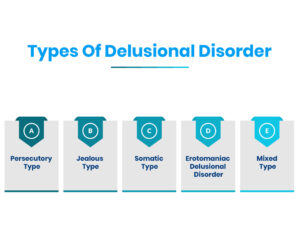Delusional Disorder is an intricate mental health disorder in which individuals believe in something very strongly, and that is not founded on reality, even though clear indications show otherwise. These delusions tend to be specific to particular themes that include jealousy, persecution, or grandiosity. Moreover, it may have a great impact on normal life, interpersonal relationships, and emotional well-being.
In contrast to other psychotic disorders, individuals with Delusional Disorder generally lead a normal life in other aspects of life, other than the delusional beliefs. The significance of understanding this condition is that early diagnosis and treatment. However, it usually includes medication, can enable people to cope with the symptoms, lessen distress, and live better lives
What Is Delusional Disorder?
Delusional Disorder is a mental disorder where an individual is absolutely convinced of things that are not even true, when there is clear evidence that counters it. Therefore, these are known as delusions, and they tend to be related to events that might happen in actual life. However, unlike other mental illnesses, delusional disorder sufferers tend to act and operate normally in their daily lives.
Similarly, delusional Disorder does not consist of mere worry or imagination, as the individual is fully convinced of the false notion. As an example, a person might still believe in the facts despite being shown by friends and family. This situation may, in turn, impact relationships, work, and wellness. With the right medication and attention, those who have delusional Disorder can manage their symptoms and lead a normal life
Symptoms of Delusional Disorder?
There are the following signs of delusional Disorder:
- Strong false beliefs
- Believing someone is in love with them
- Extreme jealousy without proof
- Thinking they have a serious illness
- Normal behavior except during delusions
- Refusing to accept facts
- Irritation when beliefs are questioned
Causes of Delusional Disorder
The following are also possible causes of delusional Disorder:
- Familial psychiatric history.
- Imbalances in the brain chemistry.
- Long-term social isolation.
- Distrust or suspicion of traits of character.
- Medical or neurological brain disorders.
- Older age may predispose to delusions.
- Side effects of medicines or substance abuse.
- Low coping ability in stress.
- Brain structural or functional imbalance.
Types Of Delusional Disorder

1- Persecutory Type
They may be certain that their neighbors, colleagues at work, or even strangers, are their enemies. In addition, this makes them feel insecure and suspicious of the people they come across. This may cause relationship problems and stress in normal life. The fact is not able to make them stop believing in these beliefs
2-Jealous Type
In the manifestations of jealousy, one is made to think that their wife or lover is cheating on them, but there is no solid evidence to support the claim. Therefore, the result of this behavior is usually an ugly and confrontational relationship. The misconception is becoming larger and larger, and trust is very hard to earn. Due to this fact, the relationship may get very hurt.
3-Somatic Type
Here, one believes they have a physical defect or a serious medical problem, yet the doctors do not detect anything wrong. This causes anxiety and disruption in day-to-day life. Even when negative test results are received, they still believe that something is wrong.
4-Erotomaniac Delusional Disorder
Delusional Disorder Erotomaniac Delusional Disorder occurs when an individual is strongly convinced that a person, more frequently of elevated rank, is in love with them. They can perceive simple behaviors or gestures as some hidden signs of love.
5-Mixed Type
In mixed type, two or more delusional themes can be experienced by a patient at the same time, such as feelings of being mighty, for example. The overlapping delusions are likely to complicate the condition. It will only bring additional confusion and stress in life. This, therefore, complicates treatment.
Delusional Disorder Examples
The following are some of the simple cases of delusional Disorder:
- Even when none are discovered, a man thinks that his neighbors are covertly watching him using a camera.
- A woman believes that a celebrity actor is in love with her and writes him letters every day, though they have never met.
- A husband keeps on accusing his wife of cheating, watching her phone, and trailing her, although she is not.
- An individual will insist that they have a serious illness such as cancer and go to several doctors, yet test results keep showing a negative response.
- One believes that people in the street talk about them or set out against them, making them afraid and stressed.
Delusional Disorder Vs Schizophrenia
Delusional Disorder | Schizophrenia |
| The main symptom is long-lasting delusions | Includes delusions, hallucinations, disorganized speech, and behavior |
| They usually function normally apart from delusions. | They struggle to function in daily life. |
| They rarely experience hallucinations. | They often experience strong hallucinations. |
| They keep their thinking and speech mostly clear. | They speak and think in a confused or disorganized way. |
| They show symptoms that stay specific and focused. | They exhibit symptoms that impact various aspects of life. |
Tips to cope with Delusional Disorder
Seek Professional Treatment
Seek the services of a psychiatrist or therapist specializing in psychotic disorders. A professional prescription gives a proper diagnosis and the appropriate plan of treatment. Prevention of complications and symptoms can be reduced with the help of early care. Be regular with follow-ups on the long-term progress.
Learn About the Condition
Fear and confusion are minimized by understanding delusional Disorder. Psychoeducation assists you in the identification of symptoms and triggers. Knowledge will enable you and your beloved family to react calmly. It is through awareness that better decision-making and coping are made.
Cognitive and Coping Skills
Therapy may teach how to challenge and deal with counterproductive beliefs. Rather than going over the thoughts, learn to challenge them mildly. Reality-checking decreases the grip of dogmatic thoughts. These skills will eventually create resilience.
Build a Support System
Reliable family or friends may help to comfort and stabilize. They are effective in supporting when they are non-judgmental listeners. With good relationships, treatment will be easier to adhere to. Connectedness reduces stress and loneliness.
Lead a Healthy Lifestyle
Good sleep, physical activity, and healthy food enhance mental health. An organized schedule reduces stress and stabilizes mood. Avoiding alcohol or medicines may prevent worsening of symptoms. Little things in everyday life help.
Prepare a Crisis Plan
Make an emergency plan with your doctor. It must contain warning signs, useful steps, and contacts. Be safe by sharing it with supportive people. A plan is stress-relieving.
Delusional Disorder Treatment
Delusional Disorder Test
No single test can diagnose delusional Disorder. Mental health professionals use structured interviews, questionnaires, and clinical observation. They also exclude causes of medical conditions or the use of substances that could present them in the same way. The procedure would help to diagnose correctly and provide proper care.
Initial Assessment
A comprehensive psychiatric assessment is the initial treatment process. The service provider examines health history, symptoms, and life experience. Family input can also be involved in order to get to know the condition. The evaluation helps develop an individual treatment plan.
Medication Management
Delusional thinking is usually treated using antipsychotic medications. Medication management will make sure the appropriate dose is taken with the least side effects. It is necessary to visit a psychiatrist who will monitor progress regularly. Medication adherence highly enhances the results of recovery.
Concluding Note
Delusional Disorder is a severe mental disorder that may profoundly impact day-to-day life, relationships, and general well-being when not addressed. At MAVA Behavioral Health, we offer both caring and professional services to ensure that people can control their symptoms.
Treatment plans are made by our providers based on the individual needs of the patient through personalized psychiatric assessments and closely monitored pharmaceutical management. After the support and the appropriate treatment, the quality of life of a large number of people improves significantly.
FAQs
What is Delusional Disorder?
Delusional Disorder is a psychiatric disorder where the person holds a great belief in a thing that lacks foundation in reality.
What is the symptom of Delusional Disorder?
The main symptom is the fixed false beliefs, even when they are proved to be false. Unlike schizophrenia, the people of Delusional Disorder are likely to be functioning normally in the other domains of life without showing much of a personality change.
What is the diagnosis of the Delusional Disorder?
The most prevalent diagnostic methods include a psychiatric examination, medical history, and ruling out other disorders like schizophrenia, mood disorders, and medical causes of such symptoms.
What are the treatment options for Delusional Disorder?
Interventions might be antipsychotics, treatment, and supportive care. At MAVA Behavioral Health, we offer customized medication therapy and sustained care to enhance the welfare of the patients.
Is it possible to recover people with Delusional Disorder?
Yes, under effective treatment and regular care, most people can learn to cope with their symptoms, minimize the effects of delusions, and improve their quality of life. The timely intervention can be helpful.









